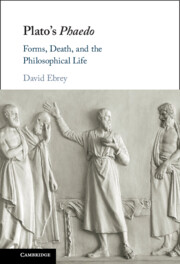Book contents
- Plato’s Phaedo
- Plato’s Phaedo
- Copyright page
- Dedication
- Contents
- Acknowledgments
- Introduction
- 1 The Characters
- 2 The Phaedo as an Alternative to Tragedy and Socrates as a Poet
- 3 Defense of the Desire to Be Dead
- 4 Cebes’ Challenge and the Cyclical Argument
- 5 The Recollecting Argument
- 6 The Kinship Argument
- 7 The Return to the Defense
- 8 Misology and the Soul as a harmonia
- 9 Socrates’ Autobiography
- 10 Cebes’ Objection and the Final Argument
- 11 The Cosmos and the Afterlife
- 12 The Death Scene
- Bibliography
- Index Locorum
- Index
4 - Cebes’ Challenge and the Cyclical Argument
69e–72d
Published online by Cambridge University Press: 02 February 2023
- Plato’s Phaedo
- Plato’s Phaedo
- Copyright page
- Dedication
- Contents
- Acknowledgments
- Introduction
- 1 The Characters
- 2 The Phaedo as an Alternative to Tragedy and Socrates as a Poet
- 3 Defense of the Desire to Be Dead
- 4 Cebes’ Challenge and the Cyclical Argument
- 5 The Recollecting Argument
- 6 The Kinship Argument
- 7 The Return to the Defense
- 8 Misology and the Soul as a harmonia
- 9 Socrates’ Autobiography
- 10 Cebes’ Objection and the Final Argument
- 11 The Cosmos and the Afterlife
- 12 The Death Scene
- Bibliography
- Index Locorum
- Index
Summary
Cebes’ challenge leads to what is typically called Socrates’ four “immortality arguments,” which structure the core of the dialogue. Despite this common label, Cebes’ challenge does not ask Socrates to show that the soul is immortal, and Socrates’ first three arguments do not claim to show immortality. Instead, Cebes challenges Socrates to address people’s fear that the soul disperses and so is destroyed when someone dies; not being destroyed upon death is, I argue, different from being immortal. After discussing Cebes’ challenge, the chapter turns to the cyclical argument, providing a new account of its basic structure. It is based on an agreement that does not require Socrates to say anything here about the nature of the soul. Nonetheless, the argument is important for aiming to show that a Pythagorean view is correct – reincarnation – by understanding death and rebirth as part of a much larger phenomenon: the coming to be and passing away of opposite things.
Keywords
- Type
- Chapter
- Information
- Plato's PhaedoForms, Death, and the Philosophical Life, pp. 88 - 99Publisher: Cambridge University PressPrint publication year: 2023

